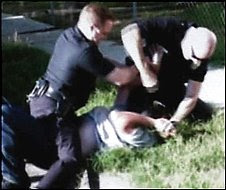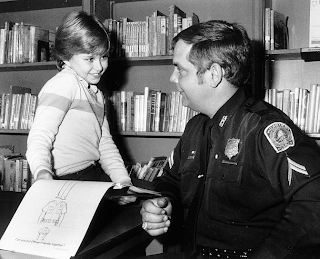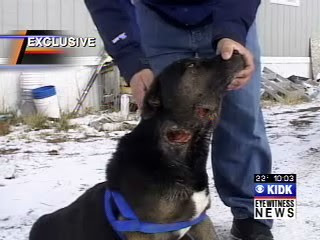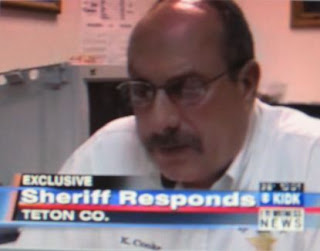Wednesday, March 12, 2008
Who’s Afraid of “Rate My Cop”?

Each week, if not every day, brings in its train another illustration of the fact that those who scrutinize us cannot abide reciprocal scrutiny. Witness the apparent demise of the “Rate My Cop” website.
Carly Kullman, a one-time police cadet, explains that Rate My Cop was to be a national database of police officers and agencies. Users would be able “to browse through their own local police department and see how their local police force stacks up” when compared to other agencies across the country. The site would deal only in publicly available information about agencies and individual officers. Each officer would be rated on the basis of three criteria: authority, fairness, and satisfaction.
Rebecca Costell, a creator of Rate My Cop, said that the objective was to combat an emerging stereotype of police as abusive, violence-prone revenue hogs: “Our website’s purpose is to break that stereotype that people have that cops are all bad by having officers become responsible for their actions.”
Of course, stereotypes don’t materialize spontaneously, and the image Costell describes has been abundantly validated over the past couple of years with the emergence of YouTube and other forms of cyber-samizdat. The near-ubiquity of cell phones and other digital recording devices has made it possible to record episodes of police misconduct, and video sharing sites have made those recordings available to anybody with a high-speed internet connection.
Rate My Cop’s very practical and commendable contribution to the necessary — and overdue — public conversation about police misconduct is to provide an incentive for internal police reform: The site would help burnish the reputations of genuinely professional, service-oriented departments and officers, while goading others to clean up their act.

Additionally, as Kullman points out in reviewing the site, “People who are potentially moving to another city might use Rate My Cop to check out the police force in the area that they are moving to, allowing them to see how the police perform….”
In these ways, Rate My Cop would have applied the logic of the free market to the practice of law enforcement. The problem here, of course, is that our current approach to law enforcement is entirely statist, which means that it’s designed in a manner intended to insulate it from market discipline.
In unadorned terms, the last thing police want is to be accountable to the communities they’re supposed to be serving. Accordingly, police unions immediately began to shriek and keen that Rate My Cop posed a threat to …
… wait for it …
… wait for it …
… that’s right: “Officer safety.”
I’ve said it before: “officer safety,” not protection of the law-abiding public, is the highest priority of every police department, and every effort to reform police conduct or hold police publicly accountable is condemned as a threat to the same by the professional whiners who represent police unions.
In this case, there was a legitimate threat, since Rate My Cop did imperil the job safety of bad, indifferent, or corrupt police officers. Of course, it also offered a way to reward and promote the conscientious, heroic officers we are constantly assured constitute the vast majority of police.
Apparently, it was that positive stereotype — which is still the preponderant image in most media and entertainment depictions of police — that would have suffered, or perished, because of Rate My Cop. So the “law enforcement community,” as an appendage of the Leviathan State, did what such people always do when threatened with accountability: They used the threat of legislation and criminal sanctions to compel Rate My Cop’s creators to shut down the site.

Interestingly, the first recorded objections to Rate My Cop come from a familiar source: Utah state senator Chris Buttars, sponsor of SB260, a measure intended to suppress reports of police misconduct. As Salt Lake City CBS affiliate KUTV reported on February 12: “A main concern of SB260 supporters is with the buisness `rate-my-cop,’ which is a national company that has made requests for misconduct reports on every officer in every agency in the area. Buttars believes that `rate-my-cop’ will put the information into a data base and sell it to defense attorneys.”
Buttars, like other petit-authoritarian Republicans with a basically Cardassian* concept of how the justice system should operate, finds it unconscionable that defense attorneys might have the means to impeach the testimony of a police officer. Those of us who understand that the purpose of a trial should be to force the State to prove the guilt of a defendant have no problem, of course.
I recently mentioned Senator Buttars and his proposal in connection with the case of Kevin Buttars, an abusive Deputy Sheriff from Montpelier, Idaho who may be related to him. As noted previously, Buttars was recently convicted of battery and sexual assault against a prisoner, and given a sentence of surpassing triviality for that crime.
Before the March 2007 incident that led to Buttars’ conviction, he had worked as a law enforcement officer in Bonneville County, where — according to some — he had a reputation for being short-tempered, foul-mouthed, and unprofessional. It’s easy to see why Buttars might have disliked a system like Rate My Cop. It’s possible that a system of that sort might have weeded him out before he beat, choked, and simulated sodomy on a suspect who dared return the favor when Buttars started treating him to profane verbal abuse.
The Teton County Sheriff’s Department offers another illustration of the potential value of a Rate My Cop-type system. The exquisitely lovely and thinly populated region of southeastern Idaho was thrust into the national spotlight with news of the drug-related arrest of actress Dawn Wells, better known to men of a certain vintage as Ginger’s better-looking friend on Gilligan’s Island.

As I read about this case, my second reaction — my first being, “Wait a second — Mary Ann lives here in Idaho?” — was a moment of disgusted recognition when I read the name of the officer involved in her arrest: Deputy Sheriff Joseph Gutierrez.
About a month after he collared Gilligan’s girlfriend, Deputy Gutierrez committed a felony by illegally attempting to murder a Black Labrador Retriever mix named “Bobby,” a dog owned by Leo Barboza of a small town called Felt. Leo and his family got Bobby as a puppy about five years ago, and everybody in their neighborhood seemed to find the dog friendly and agreeable — except for one mentally handicapped lady, who filed several police reports claiming that the dog had attacked her. This troubled woman, significantly, was notorious for causing problems with dogs, rather than being the victim of canine misconduct.
On November 12, Deputy Gutierrez materialized on the front porch of the Barboza family’s home and announced that he was there to kill their dog. Alarmed, Leo demanded to know what proof there was that Bobby had done any harm to anyone; Gutierrez arrogantly proclaimed that he didn’t need any proof.
Yes, he may have had a steenkin’ badge, but Deputy Gutierrez didn’t need no steenkin’ evidence.
Cowed by the presence of a bellicose bully in a State-issued costume, Leo obediently brought out Bobby and tied him up in the front yard. His wife, father-in-law, and three-year-old son all watched in a state of growing agitation as Gutierrez retrieved a rifle from his vehicle. Nearby, a bus deposited a group of curious schoolchildren — who stood paralyzed in the street, their innocent eyes growing wide with incredulous alarm as they took in the spectacle coalescing in front of them.
In what could be described as a “life-imitates-Napoleon Dynamite” moment — but worse — Gutierrez shot Bobby in the head three times as the screams of terrified children rent the air.
(What follows is not a re-enactment; article continues after the jump)
At about 3:30 that afternoon, Gutierrez wrote in his incident report: “Shots fired. Dog is dead.” Barboza’s traumatized family had to endure another shock as Leo’s aging father-in-law suffered a severe anxiety attack that left him hospitalized.

When the family returned, they found, to their astonishment, that Bobby was alive — albeit severely wounded and bleeding profusely. They called the local media to report the atrocity committed by Gutierrez, and shortly thereafter filed a lawsuit.
Although Gutierrez was suspended, Sheriff Kim Cooke insisted — let’s say it together, now — that he had acted properly according to department policy. Cooke maintained that Gutierrez was authorized to kill the dog under Section 8.11.4 of County Ordinances, which permit “vicious” dogs to be destroyed if they are “found at large” and “cannot be safely taken up and impounded.” He also simpered that his department had received numerous death threats because of the publicity Gutierrez’s crime had received.
Oh, I see: It’s a matter of officer safety again.
Only in this case, Gutierrez’s criminal actions had created a threat to officer safety — assuming that the comments reported by Cooke were actually made, and should be taken seriously.
Bobby was not at large; he was on Barboza’s property. He was not a “vicious” animal, since he submitted to being tied up and shot without much difficulty (Gutierrez, by his own account, was on the Barboza’s property a total of ten minutes.) County ordinances and Idaho law specify that a dog must be found to have committed two confirmed attacks before being regarded as vicious, and that its owner has ten days to challenge that designation before a judge.
In other words: A dog, being a form of personal property, cannot be destroyed without due process of law.
And — note this well, Gutierrez — “due process” doesn’t automatically occur whenever some punk-ass tax-feeder in a State-issued costume makes a demand of innocent people.
Gutierrez, significantly, is a recent graduate of the Idaho Peace Officers Standards and Training academy (I-POST). He is also a former Marine, albeit one who apparently doesn’t live up to the expectation that every Marine should be an expert marksman. However, he does exemplify the credo of last December’s I-POST graduating class: Don’t suffer from Post-Traumatic Stress Disorder — go out and cause some. Of this, Barboza’s family, which includes a traumatized senior citizen and a nearly murdered dog, can attest.

Talk about a cluster-bomb of hypocrisy. If the arrogant, ignorant berserker Cooke had hired as a deputy had followed the rules, none of this would have happened. If he had killed the dog outright, it wouldn’t have needed the medical care it didn’t receive while the Barbozas were dealing with the more urgent matter of the father-in-law’s anxiety attack.
Sheriff Cooke is not only a hypocrite and a cretin, he’s also something of a criminal kingpin, since at least half of his department (three out of six deputies) have recently been under criminal investigation.
The Idaho Attorney General’s office has considered criminal charges against Gutierrez (on previous performance, Gutierrez has little to fear from the AG’s office). Two other deputies, Nate and Mat Froehlich, are also the subjects of official inquiries — Nate for insurance fraud, and Matt for abuse of police power.
Reid Rogers, president of the Teton Valley Chamber of Commerce, probably wasn’t exaggerating when he told the press that “There’s a growing discontent about the level of performance generally” with the Sheriff’s Department. All three of the scandal-tainted deputies are in their twenties, fresh of the fascisti farm. If they’re cashiered in Teton County, chances are they’ll show up on some other force elsewhere in the country.
This situation is altogether too typical of what’s happening in law enforcement nation-wide, and it illustrates both the desperate need for a Rate My Cop-style resource, and some of the reasons why the “law enforcement community” will do whatever it takes to keep us from getting one.
On sale now!
___
*The Cardassians were a fictional alien race — militarist in disposition, and thoroughly statist in their culture — featured in recent versions of Star Trek. Their “justice” system was designed for the sole purpose of vindicating the State and teaching subjects to submit to its all-encompassing wisdom. Guilty verdicts were preordained certainties in trials held on Cardassia Prime.
Dum spiro, pugno!
Content retrieved from: http://freedominourtime.blogspot.com/2008/03/whos-afraid-of-rate-my-cop.html.









